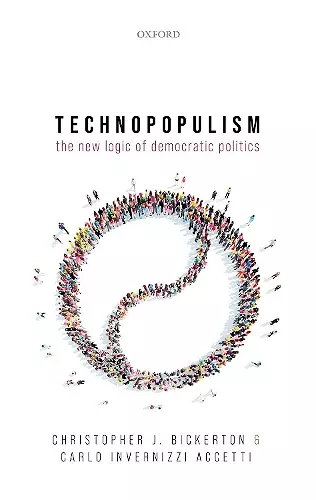Technopopulism
The New Logic of Democratic Politics
Carlo Invernizzi Accetti author Christopher J Bickerton author
Format:Hardback
Publisher:Oxford University Press
Published:25th Feb '21
Currently unavailable, and unfortunately no date known when it will be back

Technocratic appeals to expertise and populist invocations of 'the people' have become mainstays of political competition in established democracies. This development is best understood as the emergence of technopopulism—a new political logic that is being superimposed on the traditional struggle between left and right. Political movements and actors—such as Italy's Five Star Movement and France's La Républiqe En Marche—combine technocratic and populist appeals in a variety of ways, as do more established parties that are adapting to the particular set of incentives and constraints implicit in this new, unmediated form of politics. In the first book-length treatment of the phenomenon of technopopulism, we combine theoretical and historical approaches, offering a systematic definition of the concept of technopopulism, while also exploring a number of salient contemporary examples. This book provides a detailed account of the emergence of this new political logic, as well as a discussion of its troubling consequences for existing democratic regimes. It ends by considering some possible remedies that go beyond the simplistic idea that in the right 'dose' populism and technocracy can counter-balance one another.
Bickerton and Invernizzi Accetti offer a compelling analysis of the democratic predicament. They also raise important questions about why political ideologies have lost their influence, why political parties have become so disconnected, and why democratic institutions rely so heavily on the existence of intermediates between the voters, politicians and public policy ... Technopopulism is a great provocation that leaves the reader wanting even more help in understanding the challenges democratic systems are facing. * Erik Jones, Survival *
This is interpretive political science at its best: it combines conceptual innovation, a deep familiarity with historical cases and the details of contemporary politics, with a sense of normative urgency * Russell Muirhead, Perspectives on Politics *
a novel and significant contribution to the vibrant debate about the pros and cons of populism. * Ben Wellings, Australian Outlook *
Technopopulism's virtue is in weaving a convincing explanatory narrative by connecting a vast array of dots...a refreshing and unusually audacious book... [it] represents an irreversible advance in our understanding of our present historical period... It is simply not possible to go on thinking as before about our current moment after digesting Bickerton and Invernizzi Accetti's concept of Technopopulism. * Daniel Matthews-Ferrero, European Journal of Social Theory *
an ambitious and invaluable attempt at concept formation, the concept of tehcnopopulism, in order to make sense of contemporary democratic politics. * Hasan Faruk Uslu, I:&MGELEM *
an ambitious work, which makes considerable progress in studies on the transformations of contemporary democracies. * Annarita Criscitiello, Italian Political Science Review *
This conceptually innovative book helps us understand one of the peculiar political phenomena of our day: the convergence of technocracy and populism. It is also excellent in making sense of larger developments in contemporary European politics, and it contains an important normative theory of why democracies cannot do without political parties. * Jan-Werner Müller, Princeton University *
This excellent book achieves two important results: it fills a void of knowledge and names a key contemporary political phenomenon. In decoding the common grammar that underpins both populism and technocracy, it sheds new light on the present crisis of our representative democracies. * Nadia Urbinati, Columbia University *
A remarkably original and illuminating work, from which both political scientists and politicians can learn an immense amount * Richard Tuck, Harvard University *
This first-rate study shows how one of the main challenges to party democracy comes from within. As Bickerton and Invernizzi Accetti lucidly explain, rather than caught between technocrats and populists, elected representatives today are imitating and blending their claims, hoping to strengthen their own legitimacy. 'Technopopulism' is where it leads: the book offers an excellent account of the trends unfolding and the normative questions at stake. * Jonathan White, London School of Economics *
ISBN: 9780198807766
Dimensions: 245mm x 165mm x 20mm
Weight: 530g
256 pages